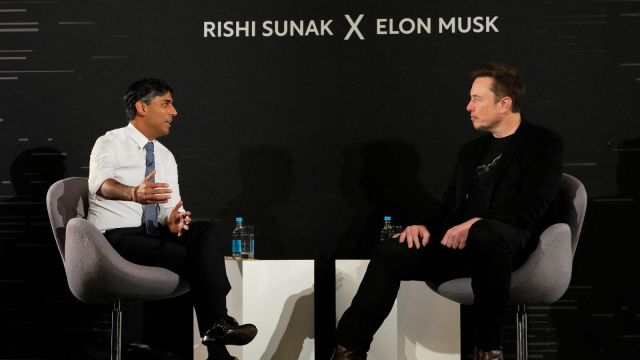
The conversation also explored the benefits of AI in terms of education, productivity, economy and equal access. They also touched upon the challenges that loom large in combating misinformation caused by AI. The long discussion also saw the leaders expressing their optimism.
Here are key takeaways from the conversation between Rishi Sunak and Elon Musk:
Developing AI safely
Sunak opened the discussion by quoting Bill Gates, who once hailed Musk as someone who has done more to push the limits of science and innovation in our times. He went on to ask Musk to share his thoughts on how it felt to be held in such high regard by Gates. In his response, Musk quipped, “That’s a nice thing to have anyone say about you, especially coming from Bill Gates.”
He soon shifted his focus to AI, on which, for nearly a decade, he has been talking about how the world needs to practise caution with AI to make it safe. While sharing his earlier concerns, Musk also acknowledged the progress in AI, such as GPT-3, adding that there is a proactive need to mitigate potential risks. “I’m glad people are taking safety seriously now. I think this AI safety conference will go down in history as very important. The potential is there for AI to have a positive effect and create abundance, but there is a ‘genie problem’ – if you have a genie granting unlimited wishes, those stories don’t usually end well. We need to mitigate the downside potential,” he said.
Governments as referee
Talking about the AI Safety Summit, Musk said that he felt it is good for governments to play an active role when it comes to public safety. With the rise of digital superintelligence, Musk said that there was a need for governments to play the role of ‘referee’ to make sure there is sportsman-like conduct and public safety concerns are addressed efficiently. He went on to say that he has been familiar with regulators in cars, aviation and rockets. While he agreed with most regulations, there were less than 1 per cent that he disagreed with.
Story continues below this ad
Addressing the concerns from Silicon Valley over regulations, Musk maintained that having a referee was good, just like in sports. He also said that even without regulations of enforcement capabilities, governments simply highlighting concerns can be powerful.
On the impact of AI on jobs
Musk called AI the most disruptive force in history. According to him, for the first time, something will be smarter than the smartest human. He went on to say that, at some point, AI will do everything. “I don’t know if that makes people comfortable or uncomfortable. It’s like a magic genie – be careful what you wish for,” he said. Musk went on to say that finding meaning in life will be challenging. He cited the Olympics, saying how humans compete with each other to be the best human, and there is meaning in that.
AI as tutors and companions
The Tesla CEO also said that AI tutors could be ‘amazing’. He said AI can be the most patient tutor on any subject. He said that they can be great for companionship, essentially an AI friend with memory of all your interactions, reading everything about you, talking to you every day, etc. The 52-year-old said that for those with learning disabilities or having trouble making friends, an AI friend could be a great asset. He went on to recommend the sci-fi novels in the Culture Series by Scottish author Ian M Banks.
AI as an enabler
When asked about what he thought about risk appetite among companies and his notions on failure, Musk spoke about perseverance. He said that if your first start-up fails, that should not be the end of your career, instead, try again. While saying that stock options are difficult in Europe, Musk said that start-ups are high-risk and high-reward.
Story continues below this ad
He also said that social media platforms are facing challenges from AI bots that are capable of passing captcha tests and manipulating information. According to him, a minor cost to use platforms could be of great help in combating bots, essentially making it expensive to create fake accounts.
On gaining public trust
With reference to upcoming elections around the world, Sunak asked about the critical nature of managing information integrity. The X chief said that authentication of real vs AI-created media could be beneficial to gaining public trust and addressing the problem of misinformation. He cited that entertainment content, like the Pope in a Balenciaga puffer jacket, is still believed to be true by many.
Regardless of the challenges, Musk said that this was the most interesting time. He said that, with AI, there was an 80 per cent likelihood of being net positive, and if we are cognizant about the 20 per cent downside risk, then, AI could be a great equaliser.









